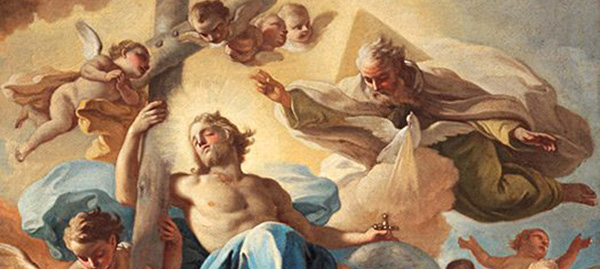
V/ I will turn to you O God,
R/ to God who gives joy to my youth
V/ Give me the Wisdom that sits by your throne;
R/ that I may be counted among your children
Lord, in your all-providential plan, you have led me to this moment to rediscover me in your Word and Wisdom. Aid me to make this time of meditation and prayer enriching, transforming, and liberating for my well-being and others. Amen!
RECEIVING DAILY PENTECOST
By Fr. Emeka Agboeze, OCD
TRINITY SUNDAY, YR C
Proverbs 8:22-31; Psalm 8:4-9; Romans 5:1-5; John 16:12-15
15th June 2025
In this solemnity the Church celebrates God whom she exists to worship. She celebrates God as God, bowing to the mystery of his being. But who is God really? St. John tells us simply that “God is love” (1Jn. 4:16). He is love both in himself and in relation to us. This shows that God is love in himself – a communion of persons. The Father is eternally the Father of the Son and vice versa. The Spirit is eternally of both. In other words, there was never a moment this loving relationship was lacking since all are co-eternal with one another.
This immeasurable love, however, has its overflowing, manifesting itself in three major events: creation, the incarnation and the sending of the Holy Spirit. Through these events God communicates himself to mankind and draws us into communion with him. In this divine self-communication, the Son plays an important role of mediation. He is the Word through whom “all things were made” (Jn. 1:3). He is the Wisdom described in today’s first reading as standing by God the Father when he created the universe, a master craftsman, “for in him all things were created: things in heaven and on earth, visible and invisible” (Col. 1:16). The first reading further describes how this Wisdom pervades God’s world, “delighting to be with the sons of men.” This is a clear reference to the incarnation, that moment when the Son, sent by the Father, manifested himself as the Redeemer of humanity. This is the event in which through the Son, “our Lord Jesus Christ, by faith we are judged righteous and at peace with God” (second reading). Finally, it is the Son who mediates the mission of the Holy Spirit whose job, as today’s Gospel shows, consists in declaring to us that which he has taken from the Son. He reminds us all that the Son has taught (Jn. 14:26-27).
These three events are a clear sign of God’s love for us, a love that seeks union with us. Having created us in his image, infusing his breath into us (Gn. 2:7), he assumed our nature at the incarnation, making us sharers in his nature. He constantly sanctifies us in the Spirit so that his image in us might shine forth. This sanctification, or making holy, carries the sense of constant setting apart – kadosh, the Hebrew word translated as holy, means setting apart. God sets us apart to be in communion with him. Jesus describes this communion in domiciliary terms. The implication is that we are God’s temple, a dwelling place for the Trinity: “Anyone who loves me will keep my word. My Father will love him, and we will come to him and make our home with him” (Jn. 14:23). There is also a sense of interpenetration in this communion, as a result of which God too becomes our dwelling place: “We live in him and he in us” (1Jn. 4:13).
St. Elizabeth of the Trinity clearly captures this idea of mutual indwelling of God and the soul. She affirms: “It seems to me that I have found my heaven on earth, because my heaven is in you, my God, and you are in my soul. You in me, and I in you.” We must, therefore, “be so immersed in the Trinity that we may be, as it were, consumed by the Father, transformed by the Son and penetrated by the Holy Spirit.”
Daily Offering
Lord, I offer myself to you anew, in scaling the heights of Carmel by taking to heart your Word and Wisdom communicated through this time of meditation. May I be transformed into a prayer presence in the World. Amen
Questions for reflection:
• How healthy is my communion with God? Do I make efforts to love him and make him loved as?
• Do I sufficiently adore the mystery of the Trinity? Do I make the sign of the Cross conscientiously or absent-mindedly, not treating it as a real profession of faith in the Trinity?
• Do I truly aspire, with Elizabeth of the Trinity, to make my life “a proof of God’s presence within me”?
Suggested Exercise for the Week:
Take the model of the Blessed Trinity as the pattern of growth for every relationship we engage.
Commit to Heart: Trinity in whom we adore
